January 19, 1990. Imagine a night in Srinagar, when the last quarter of the moon shone with a tint of silver and you realised that it was just another cold night in your hometown. You were in your bed and your family in other rooms of the house. Recent days were quite unpleasant and there were many incidents that were making the air more stressful. But you were at your house, where your grandparents, your parents and you have been living for years. What could possibly harm you there? But then you hear,
“अगर कश्मीर में रहना होगा अल्लाह ऊ अक़बर कहना होगा”
If you wish to be in Kashmir, you will have to say Allah-u-Akbar
“ऐस गच्छे कशीर, बत्ताव रोस्ते बतनेव सान”
We want the Kashmir, void of Pandit men but filled with Pandit women
“बत्ताव या रालिव, चालिव नाते गालिव”
Pandits, either convert, leave or die
People were making such intimidating slogans on loudspeakers in the same streets where you used to play. Suddenly, nothing about the night was like other nights in your hometown. Your neighbours weren’t actually your neighbours. Why you? Why were you the victim of the biggest ethnic cleansing in the country? The base of this exodus was being prepared in your backyard much before the climax.
Kashmir derives its name from a Sanskrit word káśmīra which means Kashyap’s mir(lake) or Kashyap’s meru(mountains). So, how come a state that saw Hinduism blooming in its valleys, became a muslim majority state?
There are two propagated pre-1947 histories of the Kashmir Valley. The First recounted by the minority Kashmiri Pandits, talk of the butchery perpetrated under Afghan rule in the 18th and 19th centuries, in which tens of thousands of them were either brutally murdered or forcibly converted to Islam. The second is that of the majority Kashmiri Muslims, and the discrimination they faced under the Dogra rule from 1846 to 1947. The likely truth is both these histories are indeed true. The Kashmiri Muslims, many of whom had been converted to Islam from Hinduism by the Afghans, were clearly discriminated against by the Dogras. (The Dogras were a neighbouring race of Hindus who paid the British in 1846 a lump sum to buy the rights to the Kashmir Valley as part of the Treaty of Amritsar).
The Kashmiri Pandits are the Kashmiris who practice the Hindu religion. They are the original inhabitants of the Kashmir Valley and trace their history back to thousands of years. They have survived the coming of Buddhism, Islam and finally Sikhism into the valley.
Kashmir remained a princely state even after the independence of India from British rule.Hari Singh, the Maharaja of Kashmir was a Hindu but the state had muslim majority. The demographics assured Mohammad Ali Jinnah that Maharaja will vote to be with Pakistan. At the time of partition, he said, “Kashmir will fall into our lap like a ripe fruit.” But when Hari Singh chose to remain independent, Pakistan grew impatient and launched a series of attack to sail the masses to a point where they demanded their ruler to join Pakistan. No such ambitions were turned to reality. Hari Singh called India for help and in exchange offered India to annex the state of Kashmir. Lord Mountbatten, the Governor General of India, stated the will of Jawahar Lal Nehru to the Maharaja that plebiscite or referendum should be held to determine the future status of Kashmir as according to Nehru, the will of the natives was of higher importance than its ruler.
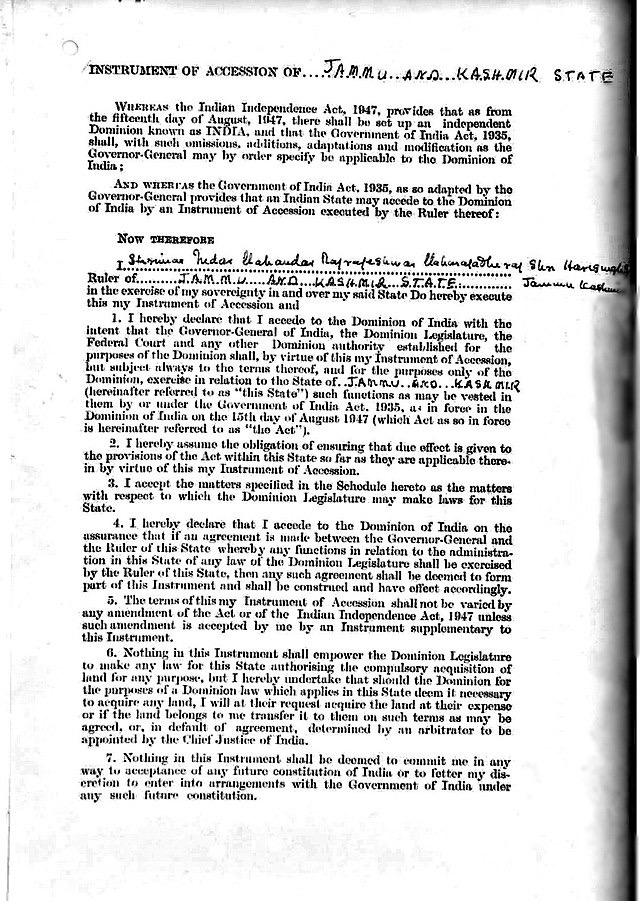
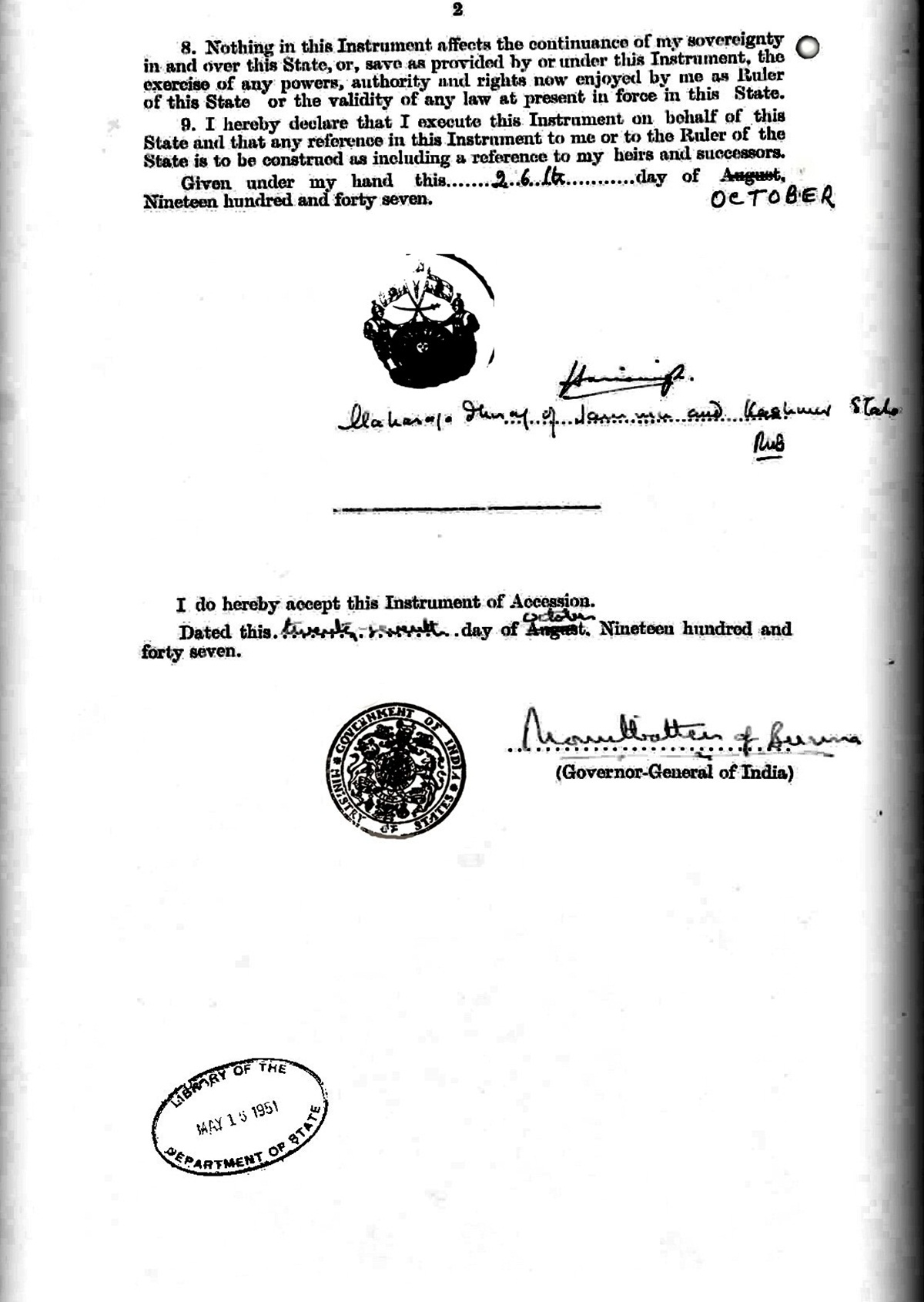
Source : National Archives of India
This is where Sheikh Abdullah comes into the light. He was the leader of National Conference and was one of the favourites of Gandhi Ji (The basic requisite to be favourite of the Mahatma was to demand peacefully a self government, organise peaceful protests and frequent attendance to jail . Sheikh Abdullah checked all the boxes by doing all this with Maharaja Hari Singh which the Congress leaders used to do with the British).
In 1946, Sheikh Abdullah launched Quit Kashmir movement against Maharaja Hari Singh and was sentenced to three years imprisonment, but when Kashmir was about to be annexed to India, Nehru and Sardar Patel (one of the few incidents where both were on same page) on the recommendation of Gandhi Ji asked Maharaja Hari Singh to release Sheikh Abdullah and to appoint him the head of emergency administration. Maharaja had no choice but to accept the demands in order to save Kashmir from Pakistan’s supported Pashtun attacks with the help of Indian army. Thus, Sheikh Abdullah stature grew with time and he eventually became the Prime Minister of Kashmir in 1948. Just after assuming the office of the Prime Minister, his true motive became evident. He was in the favour of independent Kashmir. Indian agencies collected evidences against him being in contact with Pakistan. Case was filed against him and he was removed from his position of Prime Minister and was imprisoned in 1953 on several charges where the obvious verdict would have been death punishment. Gandhi Ji and Sardar Patel weren’t alive to see their blunder in trusting a snake and Nehru was too proud to accept it. Evidences against Sheikh Abdullah mysteriously vanished and he was given a clean chit in 1964. Many sources indicate that it was Nehru who did all this to save his friend but an enemy of India.
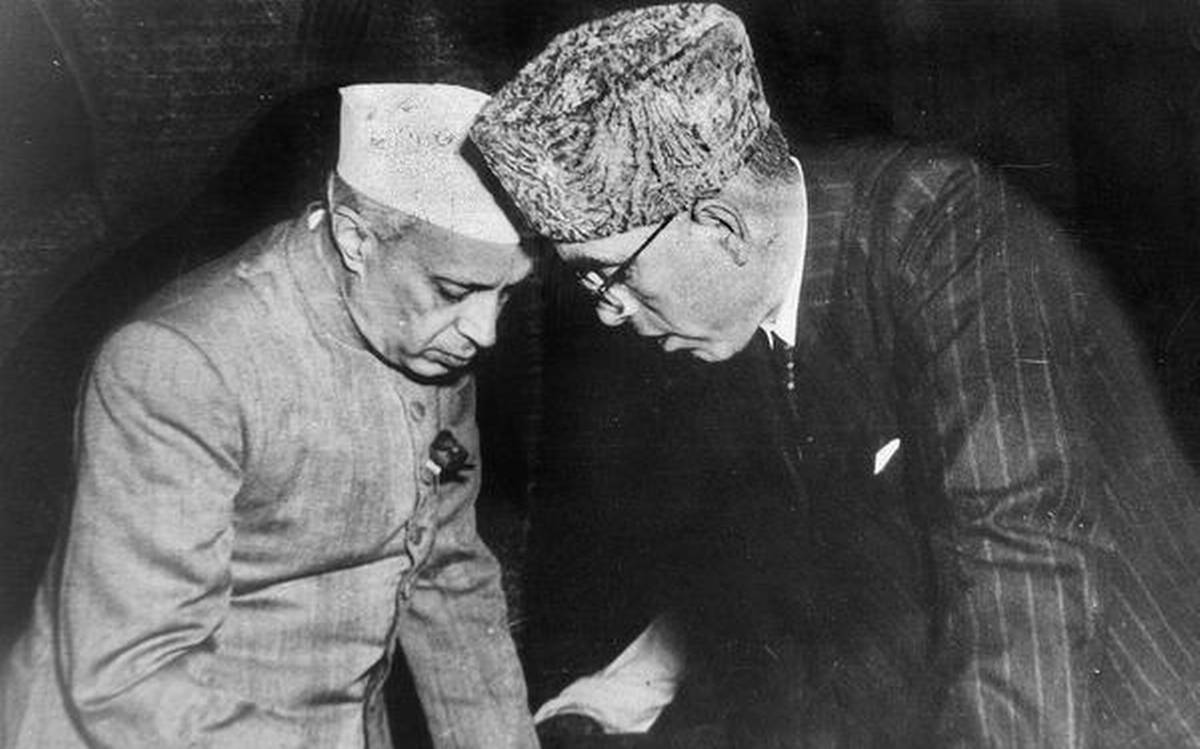
Sheikh Abdullah, after his release, continued raising voice for a plebiscite. After seeing the might of India against Pakistan in the 1971 war, he realised that it was not feasible for him to make Indian government accept his demand for plebiscite. In 1972, Abdullah announced “our dispute with Government of India is not about accession but is about the quantum of autonomy.” The 1975 Kashmir Accord, signed by Prime Minister Indira Gandhi and Chief Minister Sheikh Abdullah further strengthened India’s control over legislation in Kashmir (however Article 370 remained). It is said like begets like (The art of making blunders runs deeply in Nehru family). This accord laid down the foundation for militancy in Kashmir by providing unconventional autonomy to it. The first clause of the accord proved to be the biggest culprit. It said ‘The State of Jammu and Kashmir which is a constituent unit of the Union of India, shall, in its relation with the Union, continue to be governed by Article 370 of the Constitution of India.’ The horrendous accord lead to agitation and protests from both the sides, pro-Kashmiri revolted as they saw it as an accord that lured Sheikh Abdullah, their leader to settle for Chief Minister’s post in exchange of giving up the plebiscite call, whereas on the other hand pro-nationalists were upset because instead of abrogating article 370, this accord enhanced its importance.
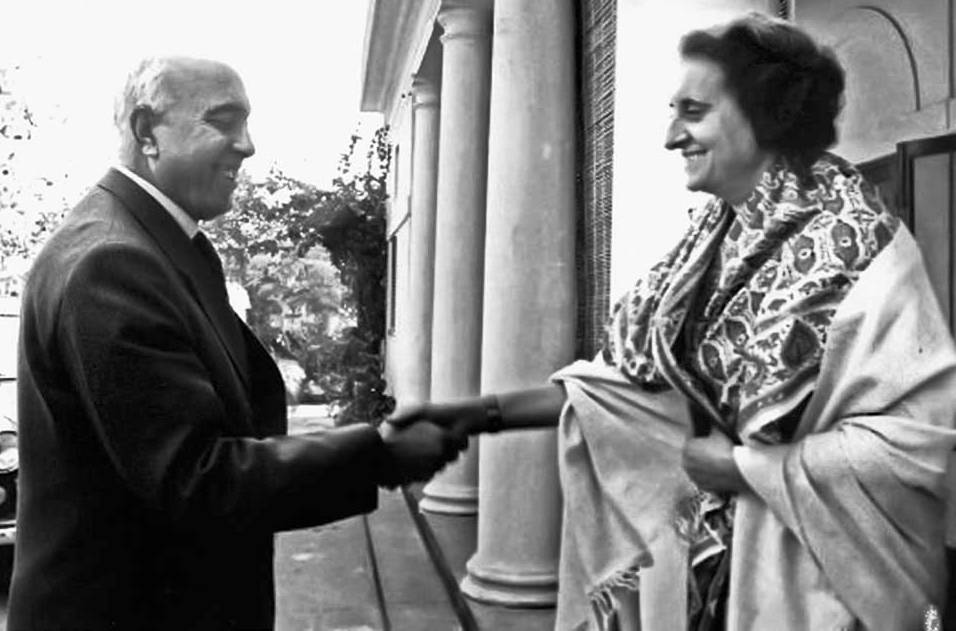
In 1980, the Islamization of Kashmir began with full force. The Abdullah Government changed the names of about 2500 villages from their original names to new Islamic names. For example, the major city of Anantnag was to be known as Islamabad (same name as the Pakistani Capital). The Sheikh began giving communal speeches in mosques as he used to in the 1930s. On 13 May, 1980, while addressing a large public meeting at mazar- i-slmdha (martyrs graveyard), he (Abdullah), declared that “No one would be allowed to enslave us again, whether it is India or Pakistan.” Further he said, “ If any attempt was made to play with our fate, it would lead to disastrous consequences.” Suddenly thousands of copies of Pakistani writer Muhammed Yusuf Saraf’s book “Kashmiris Fight for Freedom” appeared in the Valley, as did “On Guerrilla War” by Che Guevara. Then an elected Member of State Parliament released a pamphlet called “The Conspiracy of Converting Kashmir Muslim Majority into a Minority.”
One can know things were moving swiftly behind the curtains when an elected Chief Minister of a state of India signals for the complete independence of the state (his life long dream). Similarly serious tension occurred on the permission for passing the Resettlement Bill of 1982. The bill passed by the state assembly provided for the return to Jammu and Kashmir of the state subjects who migrated to Pakistan 40 years ago and had since become Pakistani Nationals. In a speech from the rostrum of the holy shrine of Hazaratbal, Sheikh Abdullah denounced all critics of the bill as “Hindu communalists of North India” and accused them of wanting to upset the present communal configuration of Kashmir’s population, presumably with a view to reducing the Muslim majority into a minority.
The charisma of Sheikh inked his lies deep inside the crowds who then believed it to be true and conveyed it in all parts of the valley. The seed was sown. Your neighbours were turned against you. You, the Pandits were the well educated class living in peace, while the uneducated Muslim majority was being fed the communal poison in Madrasahs. While most of the Kashmir was in the clutches of poverty, Abdullah made wealth by fear mongering of the natives who once lived peacefully. He employed his wife Begum Akhtar Jehan, two sons, daughter-in- law, son-in-law and many other kith and kin to government and semi-government posts on fat salaries. As a conventional potentate, he died in 1982 after nominating his son Dr. Farooq Abdullah as his successor.
Farooq looked like his father in appearance but he was not like his father. He tried to bring development in the valley by signing an accord with Rajiv Gandhi, Prime Minister of India in 1986. Rajiv Gandhi promised to give the state of Kashmir 1000 crores. This accord was widely criticised in Kashmir as the pro-Kashmiris called it as “Sellout of State” to Delhi. But when Rajiv Gandhi didn’t honour his promise (He was no different than his mother Indira or his grandfather Nehru), Kashmiri masses began to look upon the centre as oath-breakers. They began to think that the centre paid no attention to them because of their religion.
This is where religious polarisation began. Muslim United Front was constituted in 1986 by miscreants who wanted to enjoy power by misleading the masses through religion. You probably would have seen your neighbours waving their party’s Green flag but ignored them because you thought it was their own faith and it had nothing to do with you. Well, now you know that it did. They felt that the victory of the Front would be a victory for the faith of Islam. We will never know what they would have done if they came to power in Kashmir. All thanks to the rigged State elections of 1987 where Congress and Farooq’s conglomerate replaced poll boxes and captured booths. Although, MUF lost the elections, they received a lot of public sympathy for their cause. People believed that Rajiv Gandhi and Farooq Abdullah deliberately took away their right to vote and betrayed them by such massive rigging. They began to perceive bad administration, rigging in the elections and many other problems as a consequence of accession to India. They thought that if they had been independent or part of an Islamic country, then perhaps they would not have faced such problems and discrimination.
Those who protested were thrown to prison. In fact, it was in prison during 1987, that the five young men who formed the Jammu and Kashmir Liberation Front (JKLF) nucleus in the Valley in 1989-90, met and on their release, took a collective decision to go to Pakistan controlled Kashmir in search of military training and weapons. They came back and told your neighbours to pick up Kalashinkov. Most of them agreed and those who didn’t were taught lessons. This was how militancy was born in Kashmir. The same JKLF was now on the streets announcing loud and clear that you, yes you must convert, flee, or get killed. So what choice did you have? While you ran for your life, women in the families like yours were openly raped and men were killed. You ran as fast as you could, carrying in your mind a serious doubt about your favourite couplet that said,
‘Gar firdaus bar-rue zamin ast, hami asto, hamin asto, hamin ast’
If there is a paradise on earth, it is here, it is here, it is here.
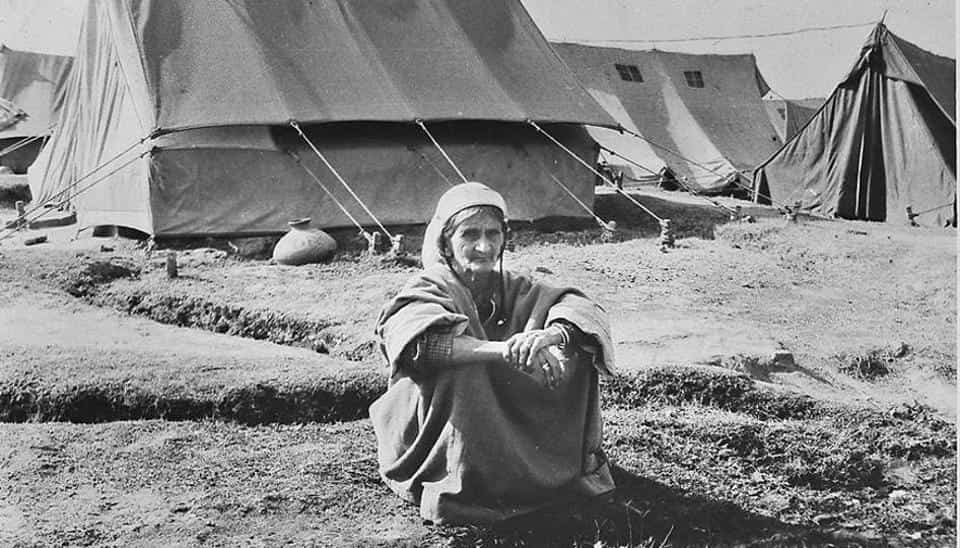
Source : Rahul Pandita, Hindustan Times
Moving south, looking back at your burning house with a heart colder than Srinagar’s snow, you asked,
‘Where is that paradise? Where? Where? Where?’
Reference/s :
• Ved Marvah, Uncivil Wars: Pathology of Terrorism in India, 1995
• P.S.Verma, Jammu and Kashmir at Polilical Crossroads, 1994
• Balraj Puri, Kashmir Towards insurgency, 1995
• Rahul Pandita, Our Moon has Blood Clots – The exodus of the Kashmiri Pandits, 2013
• Priyanka Bakaya and Sumeet Bhatti, Kashmir Conflict, Stanford University
• Indo Aryan Dictionary

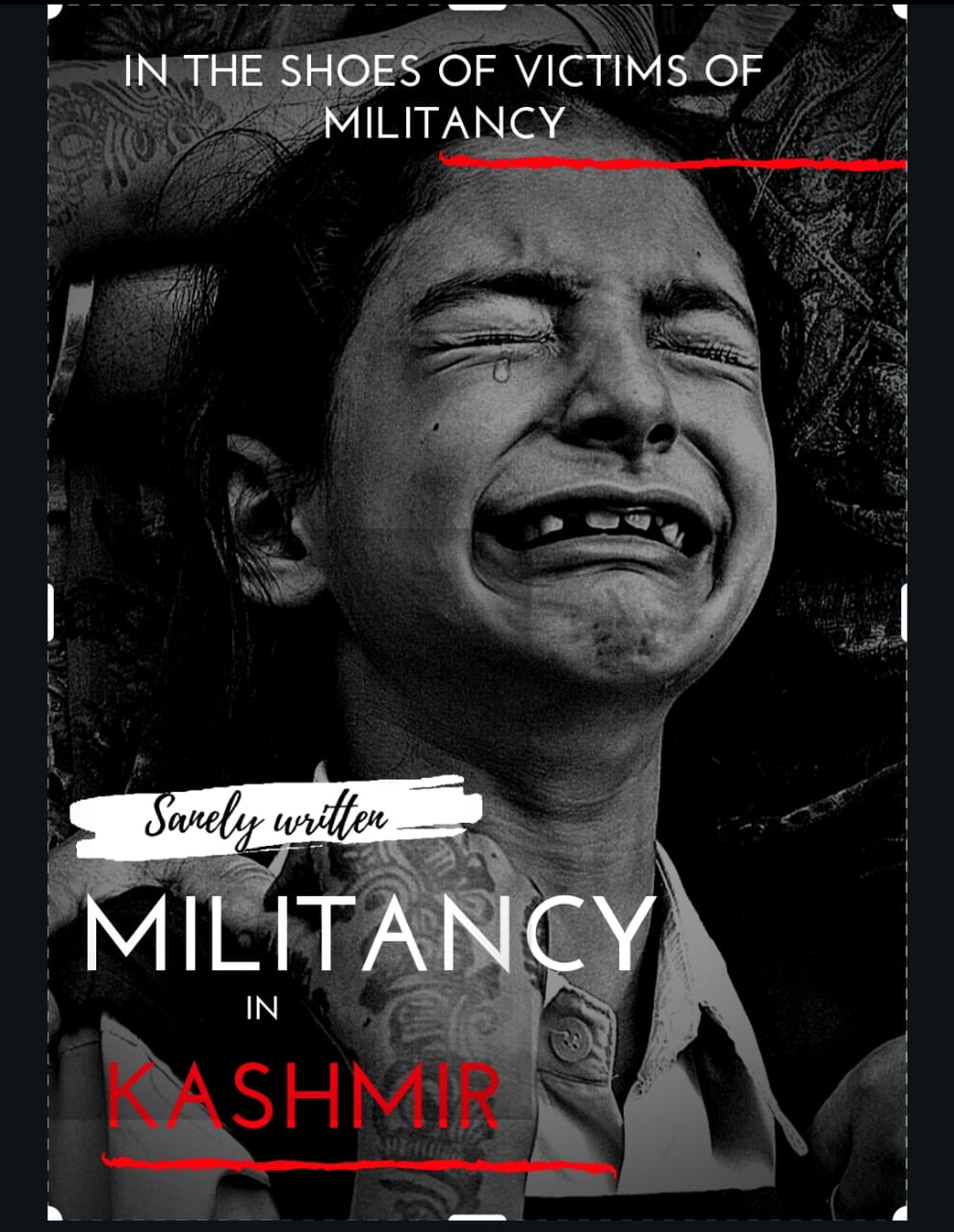


4 replies on “Genesis of Militancy in Kashmir”
Nailed it
A valley which is cursed, Kashmir!
Very informative. Your blogs are much appreciated.
Gr8